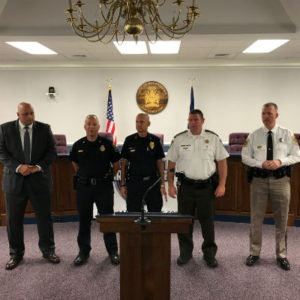Skyline Drug Task Force touts new online tool to combat illicit drug sales
 Law enforcement officials from across the region gathered in Waynesboro Thursday to talk up ReportADrugDealer.com, an online reporting tool being used to combat illicit drug sales.
Law enforcement officials from across the region gathered in Waynesboro Thursday to talk up ReportADrugDealer.com, an online reporting tool being used to combat illicit drug sales.
The website is a public service of the Skyline Drug Task Force, which includes representatives of the Virginia State Police, police departments in Staunton and Waynesboro, and sheriff’s offices in Augusta County and Nelson County.
All tips provided through the website are anonymous, akin to the methodology behind CrimeStoppers, according to Waynesboro Police Chief Michael Wilhelm.
“We don’t require them to provide us with any information. Of course, if they do want to provide us with information, we’ll follow up with that. But, it’s just like CrimeStoppers. It’s 100 percent anonymous, and we’re not trying to track the person down to obtain additional information on them,” said Wilhelm, whose department is working with Greater Augusta Prevention Partners to spearhead the effort.
A soft launch of the website last year “yielded an unexpectedly high volume of community input,” said Keith Keesee, the captain of Bureau of Criminal Investigation in the Appomattox Field Office of the Virginia State Police.
As tips started to roll in, the Task Force came to realize that the online reporting tool could provide “a valuable technological tool to leverage against the growing drug threat,” Keesee said.
Augusta County Sheriff Donald Smith cited the positive early response as prompting Task Force members to get to work behind the scenes to build something that could serve the wider region.
“All the IT departments got together in the different jurisdictions to make sure that we could separate the information coming in, that we could see it and determine whether the Task Force needs to work on it, or whether it needs to go back to the individual agencies,” Smith said.
There are safeguards in place to ensure that people don’t use the anonymity of the web to harass neighbors.
“We deal with that fairly often,” Staunton Police Chief Jim Williams said. “There’s a reason that, legally, just because somebody calls in and says, my neighbor is dealing drugs, we don’t get a search warrant and barge in. We’re actually pretty proficient in figuring out when people are doing exactly that, harassing their neighbors. It’s one piece of a puzzle in a case.”
The piece in the puzzle can be key to allow law enforcement to connect the dots.
“Tips are huge,” Williams said. “When you’re putting a drug case together, it’s like a puzzle. I can tell you many times over my law enforcement career, you just need that last piece. Sometimes that’s an anonymous tip. And sometimes we’ve had tips that totally come out of the blue, where you’ve never heard of this person before, and then investigative techniques follow through, and you make a significant case. So, they’re huge. We need to hear from the public, and this is just one more way for us to hear from the public.”
Nelson County Sheriff David Hill stressed that point – on collaboration with the public.
“One thing that I like to tell our community in Nelson County is, law enforcement officers and agencies as a whole can only be as strong as the community allows us to be,” Hill said. “With this initiative, and getting that out there, in the technological world that we live in, it allows people to get that information to us without speaking face-to-face or by phone. So, there’s somewhat of a disconnect, but we’re still connected. That’s one of the positives of it.”
Keesee said it is his hope that “members of the community will utilize this program to help in our continued efforts” to combat drug-related crimes.
“A community working together with police authorities to combat illegal drug-related crimes is not only helpful, but in many cases, in our realm of work, is necessary to accomplishing our mission,” Keesee said.





